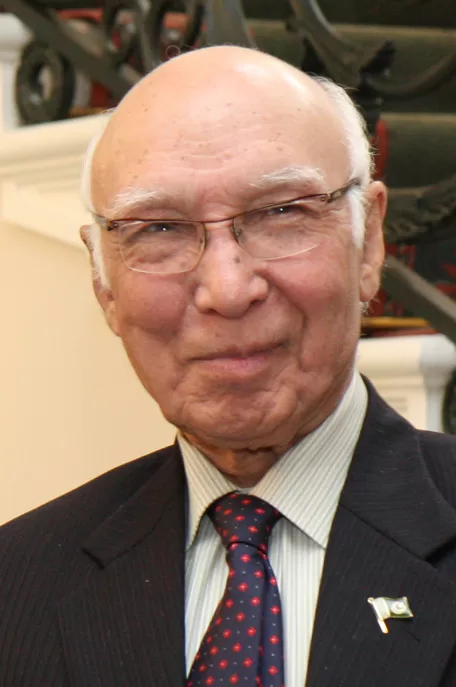The passing of Sartaj Aziz in January 2024 marked a turning point in Pakistan’s history. He wasn’t just a politician; he was a statesman, a leader whose legacy is intricately woven into the fabric of the nation. In the absence of clear policy platforms and a culture of issue-based politics, Pakistan grieves the loss of a leader who embodied these very ideals. His passing leaves a void, particularly considering his significant contributions to ensuring food security and developing a comprehensive water policy. Aziz’s most significant contribution arguably came during his decade-long tenure at the Planning Commission. Here, he found himself amidst a brilliant team of economists like Dr Mahbub ul Haq – their collective efforts shaping the country’s five-year plans, economic policies, and development projects. The camaraderie and intellectual exchange during this period nurtured Aziz’s understanding of economic and social complexities. Sartaj Aziz’s political journey, marked by significant roles such as Senator starting in 1988, exemplifies his strategic influence in Pakistani politics.
Throughout his lengthy public service, he possessed the unique ability to establish connections with individuals across political spectrums, even when they were hindering the nation’s political growth. He was proficient in working harmoniously with those he disagreed with. Additionally, having served in prominent positions in foreign institutions, he was highly respected by foreigners who held a deep interest in Pakistan’s well-being. In Pakistan’s tumultuous history, an individual like Sartaj, with his calibre, dynamism, patriotism, and strong yearning to serve the country, could play a pivotal role in revitalizing the nation. Aziz’s legacy, characterized by dedication to Pakistan’s prosperity and security, continues to inspire across the spheres of politics, academia, and policy formulation. Moreover, Aziz played a key role in the 2018 National Water Policy, achieving consensus on this contentious issue among provincial chief ministers through his calm demeanour and expert knowledge. Despite this success, the policy’s objectives—addressing water distribution inefficiencies and preparing for climate-related risks—remain unfulfilled, with the country still overly dependent on water-intensive crops and vulnerable to climate challenges. Aziz’s impact went beyond specific policies.
He embodied the very essence of statesmanship – integrity, experience, and a deep understanding of the national interest. His voice, seasoned by years of service, resonated with wisdom and a profound sense of responsibility. He navigated complex situations with a steady hand, his unwavering patriotism guiding every decision. He was more than just a politician. He was a visionary leader whose legacy is deeply entwined with Pakistan’s journey as a nation. Sartaj Aziz’s life offers valuable lessons. His unwavering dedication to public service, his pursuit of knowledge, and his willingness to challenge conventional wisdom all contributed to his immense contribution to Pakistan. Sartaj Aziz leaves behind a void that will be difficult to fill. Yet, his legacy serves as an inspiration for generations to come. It reminds us of the power of dedicated leadership, the importance of strategic vision, and the enduring value of national unity. As the nation moves forward, it would be wise to learn from the experiences and insights of such a visionary leader.
I quote from the FORWORD of my book “DREAMS AND THE REALITY” of my series “A PERSONAL CHRONICLE OF PAKISTAN” dedicated to Senator Aziz. He requested me to use the same FOREWORD as was written by Dr Sania Nishtar in Dr Abid Suleri’s book “Sartaj Aziz: A Living Legend”. So I quote: “Mr. Sartaj Aziz combines several human attributes: integrity, acumen, astuteness, vision and loyalty, which rarely exist together. His remarkable journey, starting as a young student election campaigner of the Muslim Student Federation in 1945, to the corridors of domestic and international power, over seven decades, amply qualify him as a living legend – a befitting title of this book. He is known best as an internationally-celebrated crusader against hunger and poverty.
At a time when the world was faced with a serious food crisis in 1974, he led the development of a new global system of food security. Through establishing International Fund for Agricultural Development (FAD), he played a pivotal role in the creation of a billion-dollar Fund, and a specialized UN agency, which since its creation has provided US$18.5 billion in grants and low-interest loans to projects that have reached about 464 million people in the most marginalized settings of the world. His commitment to the hunger and poverty agenda at the domestic level is evidenced by intellectual contributions early in his career such as the analytical work he presented in his first book, “Rural Development: Learning from China”.
It is also evident in the translation of evidence and knowledge into public policy, which he later shepherded in his role as chair of the Commission, which published in 1988 the 650-page landmark “Report of the National Commission on Agriculture”. It remains to-date an important source of reference on all important dimensions of agriculture and the rural economy in Pakistan. His commitment to push the needle on the hunger and poverty agenda also extended to institution-building and resulted in the creation of the National Rural Support Programme in Pakistan and the Pakistan Poverty Alleviation Fund, institutions which continue to serve the poor, to-date, at scale. Mr. Sartaj Aziz made his mark as a civil servant in the Planning Commission at a young age at a time when other developing countries, such as Korea, aspired to learn from us. His tenure coincided with the highly successful period of rapid growth in the Pakistan economy in the 1960s. In each of the professional roles he has played, he achieved distinction through his ability to create new institutions, spearheaded reform and served as the ace consensus builder.

In his political career, where he held several ministerial portfolios, including agriculture, finance, planning, and foreign affairs over a cumulative period of 16 years, he introduced major economic reforms and was responsible for more than doubling financial allocations for the social sector. As PML (N) Secretary-General, he introduced exemplary management in the party’s secretariat. He mooted the idea of the National Security Committee, which after 2013 has been institutionalized and is playing an important national security role. His 15-year career as a Senator was marked with substantive and quality contributions as well as respect for democratic institutions.
Mr. Sartaj Aziz is recognized as one of the most respected consensus builders in Pakistan and is responsible for stewardship of many negotiations bringing them to fruition with great success and technical substance. This is evidenced in the 1991 Water Accord on the Apportionment of Indus Waters, the April 1991 Award of the National Finance Commission, the 2018 National Water Policy and the landmark 2018 FATA REFORMS, which culminated in the merger of the Federally Administered Tribal Areas (FATA) into the Khyber Pakhtunkhwa (KP) province. Despite these towering achievements, his personal life embodies simplicity and humility. These attributes coupled with his unquestionable integrity offer lessons and advice for those intending to play a constructive role in national development and international political sphere.” unquote.




